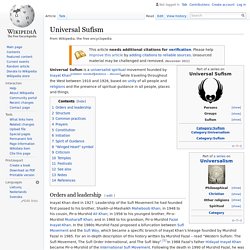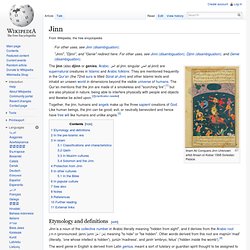

Universal Sufism. Universal Sufism is a universalist spiritual movement founded by Inayat Khan[citation needed][dubious ]while traveling throughout the West between 1910 and 1926, based on unity of all people and religions and the presence of spiritual guidance in all people, places and things.

Orders and leadership[edit] The Sufi Order International was founded by Inayat Khan’s eldest son, Pir Vilayat Inayat Khan. Pir Vilayat led the order for over 50 years, until his death in 2004. He was an avid student of many religious and spiritual traditions and incorporated the rich mystical heritage of East and West into his teachings, adding to it the scholarship of the West in music, science, and psychology. Pir Vilayat travelled widely and wrote several accessible books on Sufism, including "Awakening: A Sufi Experience" (Tracher, 2000). An American mureed of Hazrat Inayat Khan’s, Samuel Lewis, rose to prominence in the late 1960s and is well known as the creator of the Dances of Universal Peace. Prayers[edit] Jinn. Imam Ali Conquers Jinn Unknown artist Ahsan-ol-Kobar 1568 Golestan Palace.

Together, the jinn, humans and angels make up the three sapient creations of God. Like human beings, the jinn can be good, evil, or neutrally benevolent and hence have free will like humans and unlike angels.[3] Etymology and definitions[edit] Jinn is a noun of the collective number in Arabic literally meaning "hidden from sight", and it derives from the Arabic root j-n-n (pronounced: jann/ junn جَنّ / جُنّ) meaning "to hide" or "be hidden".
Other words derived from this root are majnūn 'mad' (literally, 'one whose intellect is hidden'), junūn 'madness', and janīn 'embryo, fetus' ('hidden inside the womb').[4] In Arabic, the word jinn is in the collective number, translated in English as plural (e.g., "several genies"); jinnī is in the singulative number, used to refer to one individual, which is translated by the singular in English (e.g., "one genie"). In the pre-Islamic era[edit] Sufism. Sufism (or taṣawwuf; Arabic: الصوفية) is a branch of Islam,[1] defined by adherents as the inner, mystical dimension of Islam; others contend that it is a perennial philosophy of existence that pre-dates religion, the expression of which flowered within Islam.[2] Its essence has also been expressed via other religions and metareligious phenomena.[3][4][5] A practitioner of this tradition is generally known as a ṣūfī (صُوفِيّ).

Sufis believe they are practicing ihsan (perfection of worship) as revealed by Gabriel to Muhammad: "Worship and serve Allah as you are seeing Him and while you see Him not yet truly He sees you". Sufis consider themselves as the original true proponents of this pure original form of Islam. Sufism is opposed by Wahhabi and Salafist Muslims. Classical Sufis were characterised by their attachment to dhikr, (a practice of repeating the names of God, often performed after prayers)[19] and asceticism. Etymology[edit] Two origins of the word sufi have been suggested. Shadhili. The Shadhili Tariqa (Arabic: الطريقة الشاذلية) is a Sufi order of Sunni Islam[1] founded by Abul Hasan Ali ash-Shadhili.[2] Followers (Arabic murids, "seekers") of the Shadhiliya are known as Shadhilis.

It has historically been of importance and influence in North Africa and Egypt with many contributions to Islamic literature. Among the figures most known for their literary and intellectual contributions are Ibn 'Ata Allah, author of the Hikam, and Ahmad Zarruq, author of numerous commentaries and works, and Ahmad ibn Ajiba who also wrote numerous commentaries and works. In poetry expressing love of Muhammad, there have been the notable contributions of Muhammad al-Jazuli, author of the "Dala'il al-Khayrat", and Busiri, author of the famous poem, the Qaṣīda al-Burda. Many of the head lecturers of al-Azhar University in Cairo have also been followers of this tariqa.
Of the various branches of the Shadhili tariqa are the Fassiyatush, found largely in India, Sri Lanka and Pakistan.